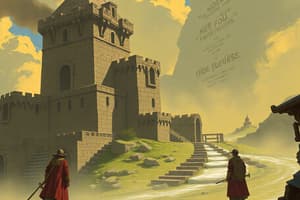Podcast
Questions and Answers
History is the study of life in society in the past in all its aspects: contemporary development and future ______.
History is the study of life in society in the past in all its aspects: contemporary development and future ______.
hopes
A historian's task is to give meaning to _____ and events.
A historian's task is to give meaning to _____ and events.
facts
The backbone of history consists of _____, which are the raw materials for historians.
The backbone of history consists of _____, which are the raw materials for historians.
facts
Accuracy in history is considered a duty and not merely a ______.
Accuracy in history is considered a duty and not merely a ______.
Auxiliary sciences such as archeology, epigraphy, and numismatics aid historians in establishing _____ and context.
Auxiliary sciences such as archeology, epigraphy, and numismatics aid historians in establishing _____ and context.
For a historian, facts do not speak for themselves; they only speak when the _____ calls on them.
For a historian, facts do not speak for themselves; they only speak when the _____ calls on them.
Some things stay the same and others experience __________.
Some things stay the same and others experience __________.
The continuous process of interaction between the historian and his facts is defined as the ______ of history.
The continuous process of interaction between the historian and his facts is defined as the ______ of history.
The study of history investigates __________ sequences to understand events.
The study of history investigates __________ sequences to understand events.
Without a historian, facts are considered _____ and meaningless.
Without a historian, facts are considered _____ and meaningless.
Primary sources include first hand documents such as letters, diaries, and __________.
Primary sources include first hand documents such as letters, diaries, and __________.
The significance of historical events relies on the importance assigned to people, __________, and movements.
The significance of historical events relies on the importance assigned to people, __________, and movements.
A __________ framework helps historians focus on how societies are organized and how people behave.
A __________ framework helps historians focus on how societies are organized and how people behave.
Empathy involves understanding the impact of past events on an individual or __________.
Empathy involves understanding the impact of past events on an individual or __________.
Contestability refers to explanations or interpretations of past events that are open for __________.
Contestability refers to explanations or interpretations of past events that are open for __________.
The Panatulong Pananaw emphasizes the interconnectedness of characteristics, values, and __________ of a cultural totality.
The Panatulong Pananaw emphasizes the interconnectedness of characteristics, values, and __________ of a cultural totality.
Flashcards are hidden until you start studying
Study Notes
History: An Interdisciplinary Study
- History encompasses the study of societal life in the past, including contemporary developments and future aspirations. It investigates events, analyzes human actions, and explores their impact on society.
Edward Hallett Carr: The Historian and his Facts
- Edward Hallett Carr (1892 - 1982) was a renowned historian and philosopher of history, known for his extensive History of Soviet Russia and his seminal work, What is History.
- Carr emphasizes the crucial role of the historian in giving meaning to facts—a symbiotic relationship between the historian and their subject matter.
- Facts form the raw materials of history, serving as the foundation for the historian's narrative. The selection and interpretation of these facts, however, are subjective and influenced by the historian's perspective.
Key Principles of Historical Inquiry
- Accuracy is a paramount duty for historians, ensuring faithfulness to the source material, but it is not the sole virtue.
- Auxiliary Sciences, such as archeology, epigraphy, numismatics, and chronology, play a vital role in establishing historical context and authenticity.
- Historians are not necessarily experts in specific fields like dating or scientific analysis but must rely on the expertise of other disciplines.
- Fact Selection is a deliberate and strategic process, as historians shape the narrative through conscious choices about which facts to include and emphasize.
- Interpretation is the lifeblood of history, where historians analyze and connect the chosen facts to form a cohesive understanding of the past.
The Historian's Dilemma
- Historians navigate a duality: a continuous process of shaping their narrative through the selection and interpretation of facts while recognizing the inherent limitations of their own perspective.
- The ongoing dialogue between the historian and their sources, the past and the present, is at the core of historical inquiry.
Seven Concepts for Understanding History
- Change and continuity: History showcases both persistent patterns and transformative shifts across civilizations and time periods.
- Multiple Causation and Effect: Identifying causal chains and developments, both short-term and long-term, is essential for understanding what happened, why it happened, and its result.
Evidence and Sources
- Primary sources: firsthand accounts and original documentation like official documents (laws, treaties), personal documents (diaries, letters, photographs), and films.
- Secondary sources: interpretations and analyses of primary sources by historians, encyclopedias, documentaries, textbooks, illustrations, websites, and reconstructions.
Significance in History
- Understanding historical significance involves evaluating the importance of past events, individuals, movements, and places.
Frameworks for Historical Analysis
- Political Framework: analyzes institutions, leadership, decision-making processes, and the dynamics of power in society.
- Economic Framework: explores economic production, wealth distribution, capital, markets, labor, and the impact of economic factors on historical events.
- Social Framework: examines how societies are organized, how people live and interact, and the influence of social structures on historical developments.
- Cultural Framework: studies the unique beliefs, customs, artistic expressions, and creative activities that define a society.
Context and Perspective
- Historical interpretations are influenced by the historian's context, including their age, gender, social position, beliefs, and values.
Empathy
- Empathy enables historians to understand the impact of past events on individuals and groups, fostering a sense of connection and understanding.
Contestability
- Historical explanations are not always definitive, and interpretations remain open to debate, fostering a dynamic and evolving understanding of the past.
The Historical Process: A Two-Phase Approach
- Historians often engage in a two-phase process:
- Research Phase: Extensive reading of sources and compiling factual information.
- Writing Phase: Synthesizing information, forming interpretations, and constructing a narrative.
The "Pantayong Pananaw" (PP) Perspective
- Inclusive Perspective: PP emphasizes interconnectedness and inclusivity, embracing all Filipinos, both present and absent.
- Filipino-Centered: It prioritizes understanding and interpretation from a Filipino perspective, promoting self-awareness within a shared history.
- Mentalidad: PP recognizes the unique thought processes and cultural values that underpin Filipino identity.
Studying That Suits You
Use AI to generate personalized quizzes and flashcards to suit your learning preferences.




